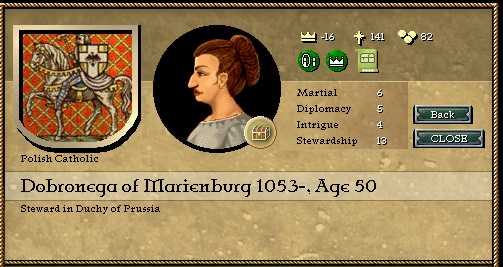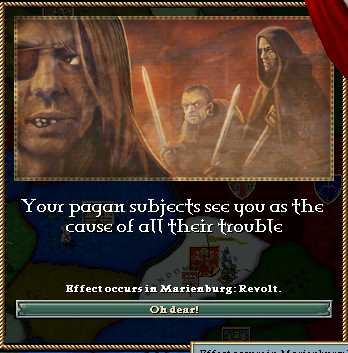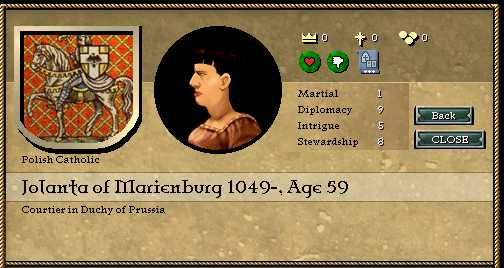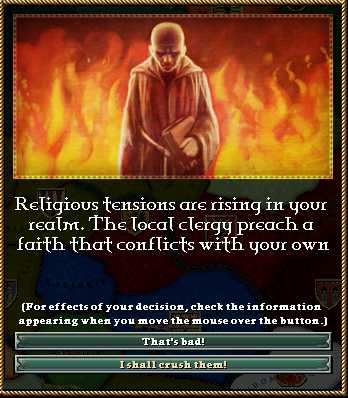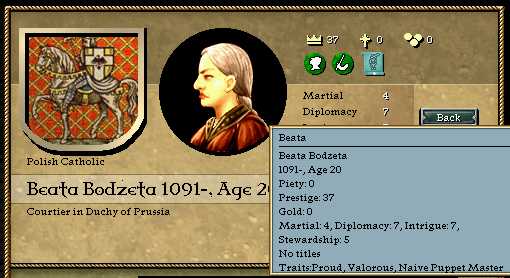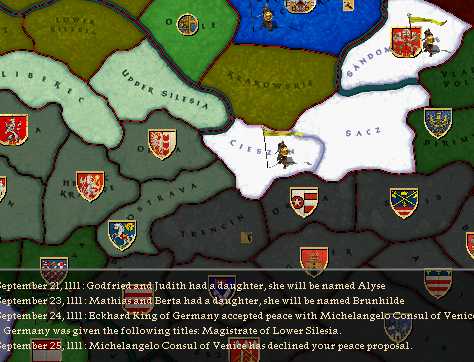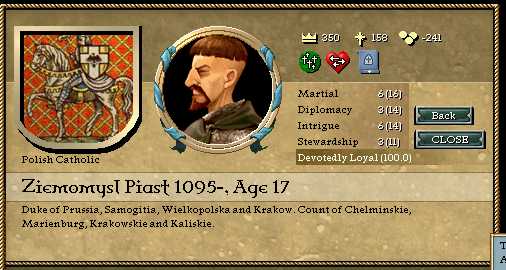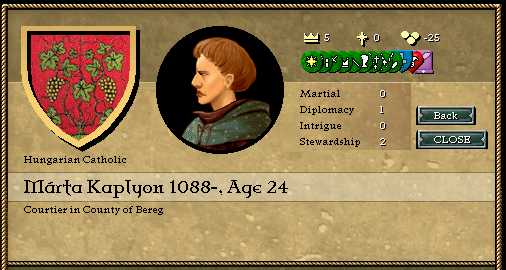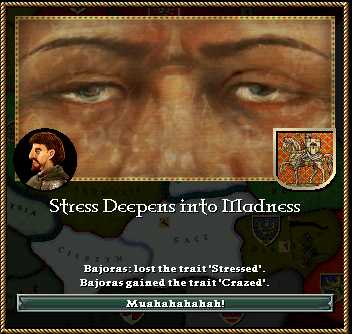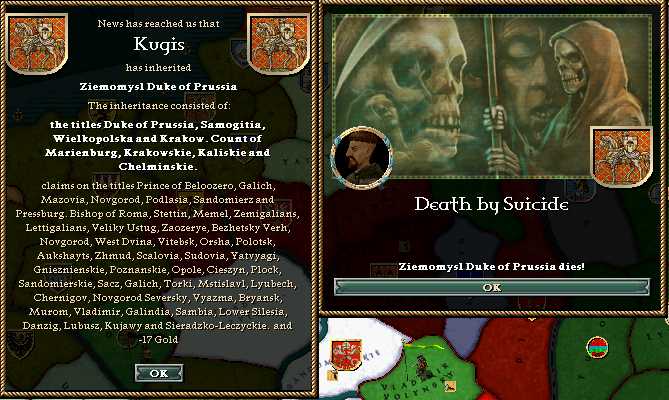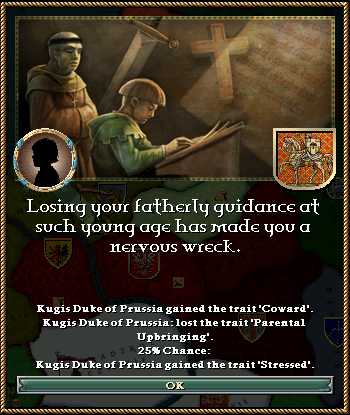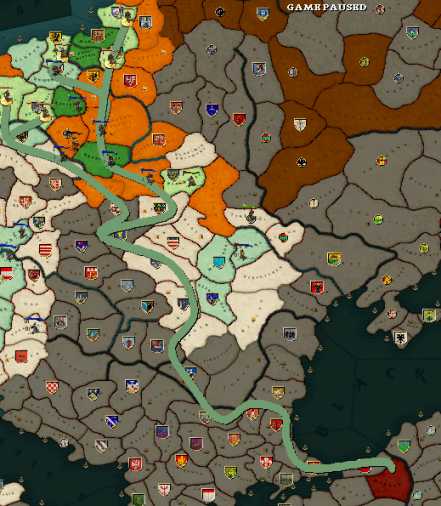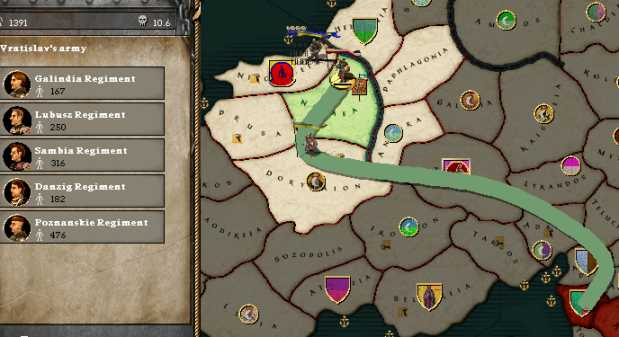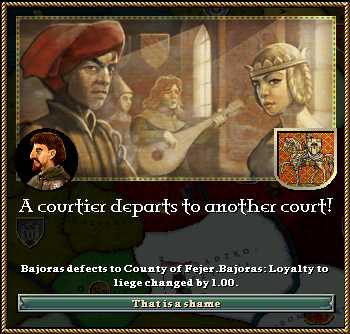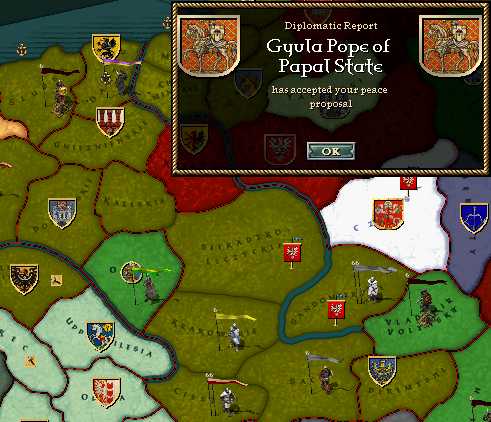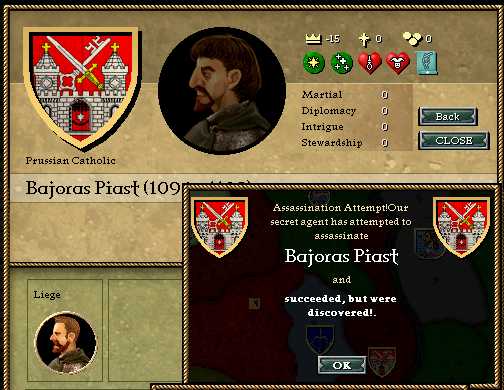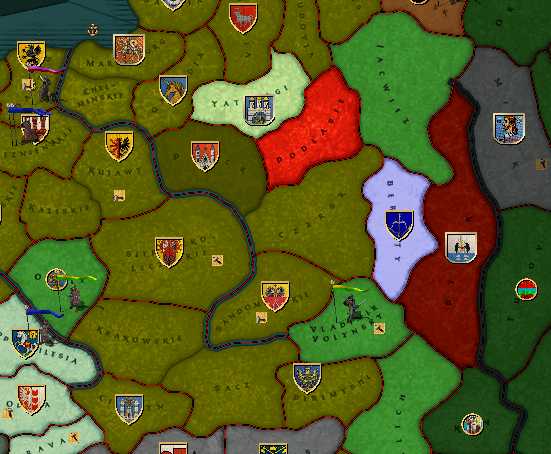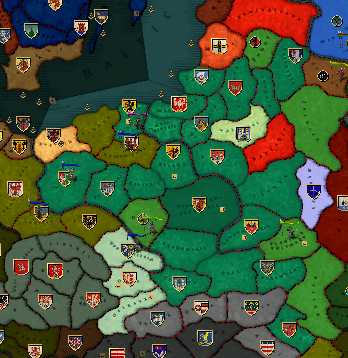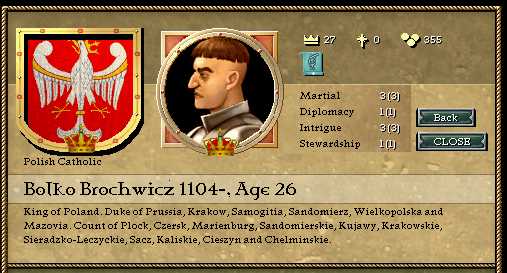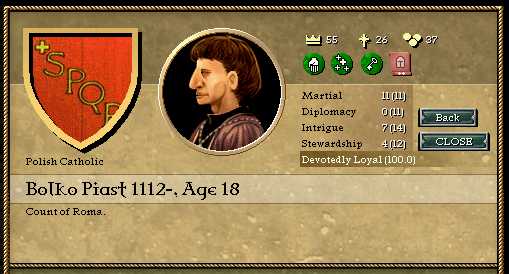The Fall of the Kingdom of Poland
And the Fate of the House of Piast
And the Fate of the House of Piast
In 1066, Poland was ruled by Boleslaw Piast, an energetic and proud king known throughout Christendom as a valiant and talented warrior. These talents would prove to be Boleslaw's doom, for his gains in the east presaged the events that would undo his kingdom. The first such gain was Kiev, which submitted to Polish rule in 1066. Boleslaw instituted elective law to cement this union, effectively promising the Russian prince that he would inherit Poland upon Boleslaw's death.
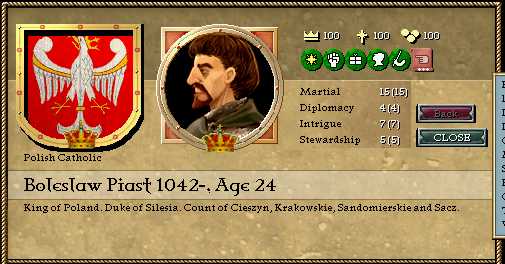
The king married a Hungarian princess named Krisztina, a union that proved fruitful. At first she bore him only daughters, Zwinislawa and Beata, but a prince was finally born during the Polish conquest of Prussia in 1071. Boleslaw named the boy Jakusz and decreed that Prussia would be his. Despite the happy and prosperous marriage, Boleslaw fathered many bastards. Krystyn, born in the same year as Jakusz, would prove to be the most important of these illegitimate children.
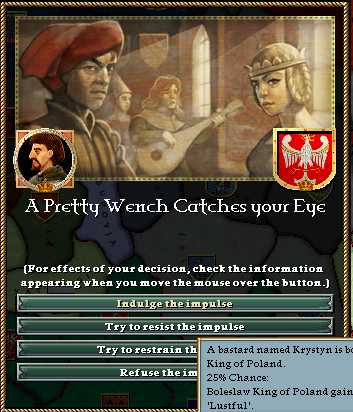
By late 1073, the lands of Danzig, Prussia, and Samogitia had fallen to Poland. Boleslaw had guided his kingdom into a strong alliance with the German emperor, and the two kings divided Pommerania between themselves. Boleslaw continued to father daughters over the next several years. Danuta was born in 1075 and Helena followed in 1079. A month later, Boleslaw returned to the field to lead Polish armies into the Pagan lands of Lithuania.
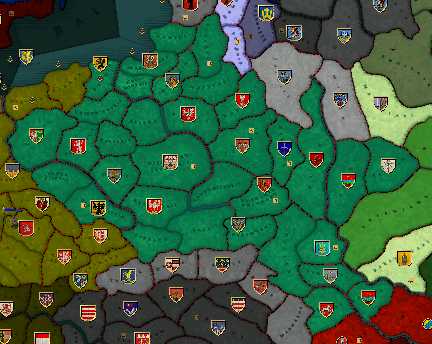
With assistance by the Teutonic Order, the Pagans were swept aside in less than two years. Boleslaw was proclaimed king of Lithuania by the pope on June 20th, 1081. Despite a rumor among the peasants that Boleslaw was a coward rather than a hero, the king continued to prosper. The prince of Kiev inherited Novgorod in 1082. Boleslaw began conquering the remaining isolated Pagan tribes.
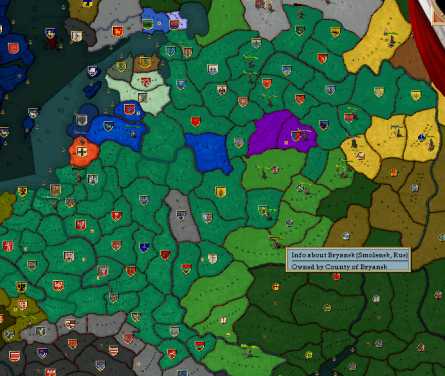
The expansion over half of Russia proved to be too much. The pope turned on Boleslaw in 1083, excommunicating the king for his obsession with the north and his failure to crusade against the Saracens. The next year, half of Novgorod was inherited by a Byzantine noble. By 1085, peasants were in revolt in villages around Poland. Boleslaw sought an opportunity to reverse his fortunes. In 1086, he made the fateful decision to attack the Pagan Cumans. The short war proved disastrous. Silesia refused to send troops and seceded outright in 1087, while thieves swept through many Polish towns. The only bright star in the war was Krystyn, the king's bastard son, who had become a brilliant strategist. It was too late, however. In January of 1088, the war was over and Poland was defeated.
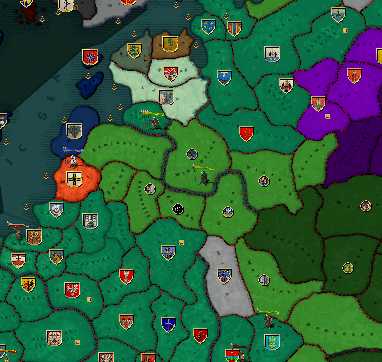
Krystyn became marshal that year, and protected Boleslaw against dozens of revolts. Opole, Krakow and an independent Kiev left in 1088. Sandomierz followed the next year and Wielkopolska broke away two years later. The conflict with Rome grew sharper when Henryk Archbishop of Sandomierz was proclaimed pope and moved the papacy to Poland. Despite Krystyn's best efforts at raising soldiers for the king, Poland crumbled rapidly. When Boleslaw's brother died and his duchy was inherited by a foreigner, the king moved to protect Krystyn. The young man was added to the succession and Krystyn's own bastard child was murdered. These decisions provoked Prince Jakusz to rebel in 1093 and Podlasia and Mazovia supported Jakusz against the king the next year. On May 12th, 1094, Jakusz seized the capital and Boleslaw was driven into exile in Novgorod, where he proclaimed himself duke. Jakusz was sorely injured in the battle and retired to Prussia.
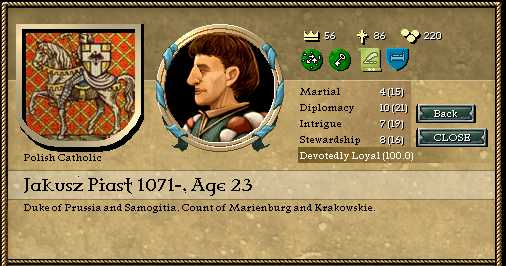
Jakusz, seeking protection after betraying his father, negotiated an alliance with the king of Germany. Prussia swore loyalty to Heinrich and became part of the empire. The same year, his wife gave birth to a son. Jakusz named the child Zbigniev. Boleslaw was overthrown again, and this time he fled to Prussia, where he reconciled with his son and became marshal.
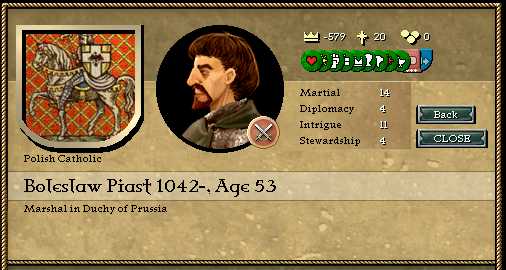
By 1096, Jakusz had fallen into a deep depression. He killed Zbigniev in March of the next year, a move that made the bastard Krystyn his new successor. Years dragged by and Krystyn died of an illness, but not before fathering a son of his own. Jakusz meanwhile lingered on in agony. The year 1101 began with his wounds becoming infected, and his condition worsened into pneumonia over the summer. Boleslaw lived in relatively good health, leading armies for the excommunicated German king against wayward vassals until his own death in 1103.
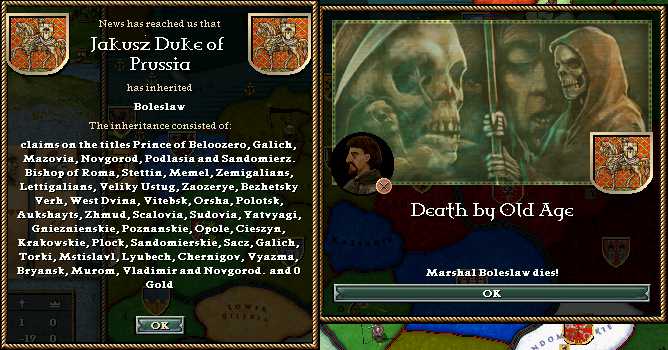
For most of 1103, Jakusz suffered as his illness grew worse. He finally expired in October, leaving his duchy to his nephew Ziemomysl Count of Krakowskie. Ziemomysl was a Piast by virture of being son of Krystyn, the bastard child of Boleslaw. His inheritence was unlikely and left an eight-year-old child as lord of the House of Piast.
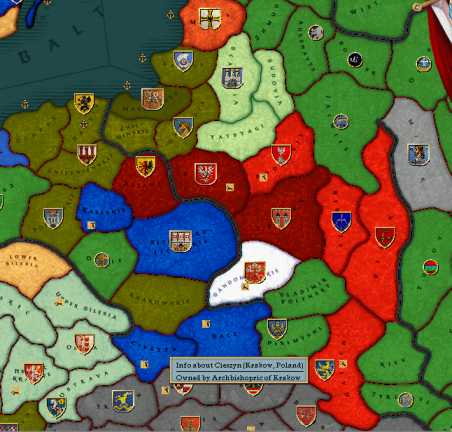
Ziemomysl had become duke of Prussia and Samogitia. The scattered remains of Poland lay to the south. Silesia was partitioned between a Bohemian king and the Republic of Venice. Independent archbishops ruled much of the kingdom's center. The east remained the property of the duke of Novgorod, a powerful Russian ruler in the north. What was left was either the property of the Cuman empire or the pope himself. Ziemomsyl was only a child, but his advisors filled his head with thoughts of Poland reborn. He swore an oath, as only a child can, to recover the kingdom his grandfather had lost.
Last edited:



